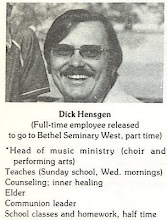
As Ken states, we were not ignored in the last months of 1975. He mentions the Humanitarian of the Year award given actually by the Human Relations Commission. It was presented by the City Council -- the same City Council that declared us (those who were leaders in the church -- particularly owners of houses used by the community) public nuisances. The Star News also named Ken as news maker of the year. We weren't ignored. Ken's article reminds us that it is better to be slandered than to be ignored. Jesus Christ was crucified. We must be true to our beliefs even in the atmosphere of oppression that was prevalent in the city during these months.
The article cited by Professor Mueller is quite interesting. It certainly validated the Charismatic Movement as well as community. When I say that it validated the Charismatic Movement, I am not referring to any excesses or fringe practices, I am referring to the "normal theological understanding" of the main stream of this movement.
Larry Clark gives a fine exposition of the scriptural necessity for praying for our friends. He takes it a step further though, when he reminds us that we must also pray for our enemies. We practiced this by praying for those who were against us in our problems with the city.
McFoone nails it when he states that church is a nice place for nice people to hear a nice man tell them to be nicer. Nice.
Clay's article discusses the heart of community living. Without love, there was no community. This is the difference between some kind of boot camp or some kind of secular pooling of money; this was not legalism, it was love. When Jesus was asked about the greatest commandment, He replied, "Love the Lord your God with all your heart and with all your soul and with all your mind. This is the first and greatest commandment. And the second is lit it: 'Love your neighbor as yourself.'" He also cites Bonhoeffer to the effect that we can't seek the ideal of community. We live in community through love of God and one another.
The plea for financial assistance is interesting. In the financial report that you will see in early 1976, we gave significantly to missions. I mentioned when this was uploaded to Facebook, that I wasn't happy about being a part of the "financial crisis." I really wasn't. I was just part of what God was doing in our midst in 1975.
The "In the family" section is always an interesting place to look. Particularly if you knew some of these people "in the day."














.jpg)